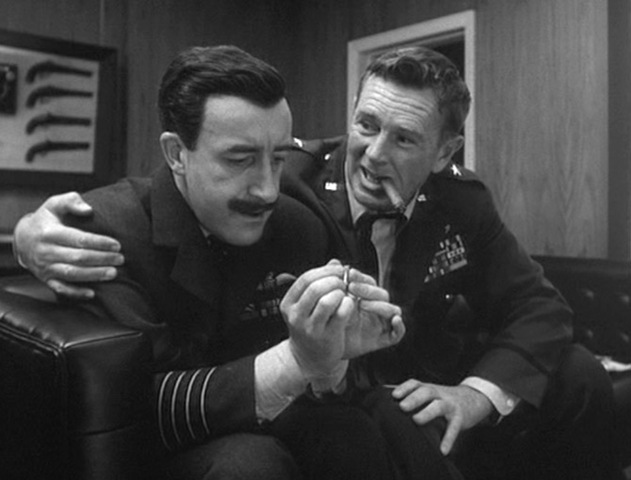While Dr. Strangelove without a doubt blurs the lines between absurdity, fear, and hilarity at times, the underlying element of truth to the story is perhaps one of the most compelling elements. We see numerous caricatures of each nationality within the film, from the rather adult-like bureaucratic attitude of the President, the hawkish General Turgidson, the likely intoxicated President (Dimitri…) of the USSR, and even Dr. Strangelove himself… the German ex-Nazi scientist whose arm constantly has trouble remembering it isn’t in the Third Reich anymore. But of the long list of characters, perhaps none strike quite the same tone as Royal Air Force Group Captain Lionel Mandrake, the timid but sane British veteran of WWII (he states he only ever pressed a button in his Spitfire when Ripper asks for his help operating a .30 caliber machine gun) who tries to convince General Ripper to call off his nuclear strike via the CRM114 recall code, and when fails, does everything in his power to determine the code and transmit it to the USAF B-52 bombers so as to avert nuclear war.
Mandrake is an interesting character for multiple reasons. At first, he can’t believe what is going on and is almost in denial. This can be seen when he delivers his private radio to Ripper stating that there has been no Russian attack because civilian broadcasting is completely undisturbed (a fact Ripper concealed from his own men by invoking a base security protocol in order to carry out his deranged plot). From this point he begins to get belligerent at times…swinging from angered and perplexed to seemingly on the verge of a nervous breakdown. This is particularly notable when Ripper puts his arm around Mandrake when on the couch in his office. Mandrake is laughing nervously and twiddling his thumbs as Ripper describes his ludicrous conspiracy theory. It is hard to not see him as a stand in for the UK…the nation that for a few hundred years had been the supreme power on the planet as far as military might and imperialism are concerned. They had largely been able to keep their empire intact for a long period of time…and now he/they are looking at the Americans with anger, confusion, and disappointment as the realization arrives that the US was largely in control for less than 2 decades before everything fell to pieces…with the situation of how this was so in the movie universe laid out before the viewers.
My questions are these: To what extent does he represent the UK in the film, and based on the context of his actions, are there any real-world events that Kubrick & Sellers could be alluding to/making a metaphor for? Also, what do the caricatures of the other nationalities featured in the film say about the cold-war attitude of the West vs. East relationship?
Edit: Here is the scene with Ripper explaining his conspiracy theory to Mandrake – https://youtu.be/J67wKhddWu4

